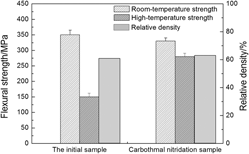No CrossRef data available.
Article contents
Fabrication and strengthening of porous Si3N4 ceramics by replacement of oxide phase with Si3N4 at grain boundary through carbothermal nitridation
Published online by Cambridge University Press: 06 July 2017
Abstract

Porous silicon nitride ceramics are attracting extensive attention due to its high strength and low dielectric loss. However, further strength enhancement at elevated temperatures is hindered by its intergranular phase, forming from sintering additives. This paper describes the fabrication of porous silicon nitride ceramic materials, by using a replacement method of carbothermal nitridation. The initial samples which were obtained from the sintering of mixed powder consisted of 95 wt% Si3N4 and 5 wt% Y2O3. After the removal of the oxide intergranular phase and the infiltration of mixtures of phenolic resins and silica sols, carbothermal nitridation process was carried out at 1550 °C for 2 h under nitrogen. X-ray diffraction and microstructural analysis revealed a complete replacement of oxide intergranular phases by the newly formed Si3N4 intergranular phase. The unmodified ceramic exhibited lower flexural strength at 1400 °C, which was only 50% of the room-temperature strength. Although the modified ceramic attained a slightly lower flexural strength at room temperature after the replacement of intergranular phase, its strength measured at 1400 °C could attain 90% of room-temperature strength.
Keywords
- Type
- Invited Articles
- Information
- Journal of Materials Research , Volume 32 , Issue 17: Focus Issue: Achieving Superior Ceramics and Coating Properties through Innovative Processing , 14 September 2017 , pp. 3344 - 3352
- Copyright
- Copyright © Materials Research Society 2017
Footnotes
Present address: School of Materials Science and Engineering, Beifang University of Nationalities, Yinchuan 750021, China.
Contributing Editor: Nahum Travitzky



